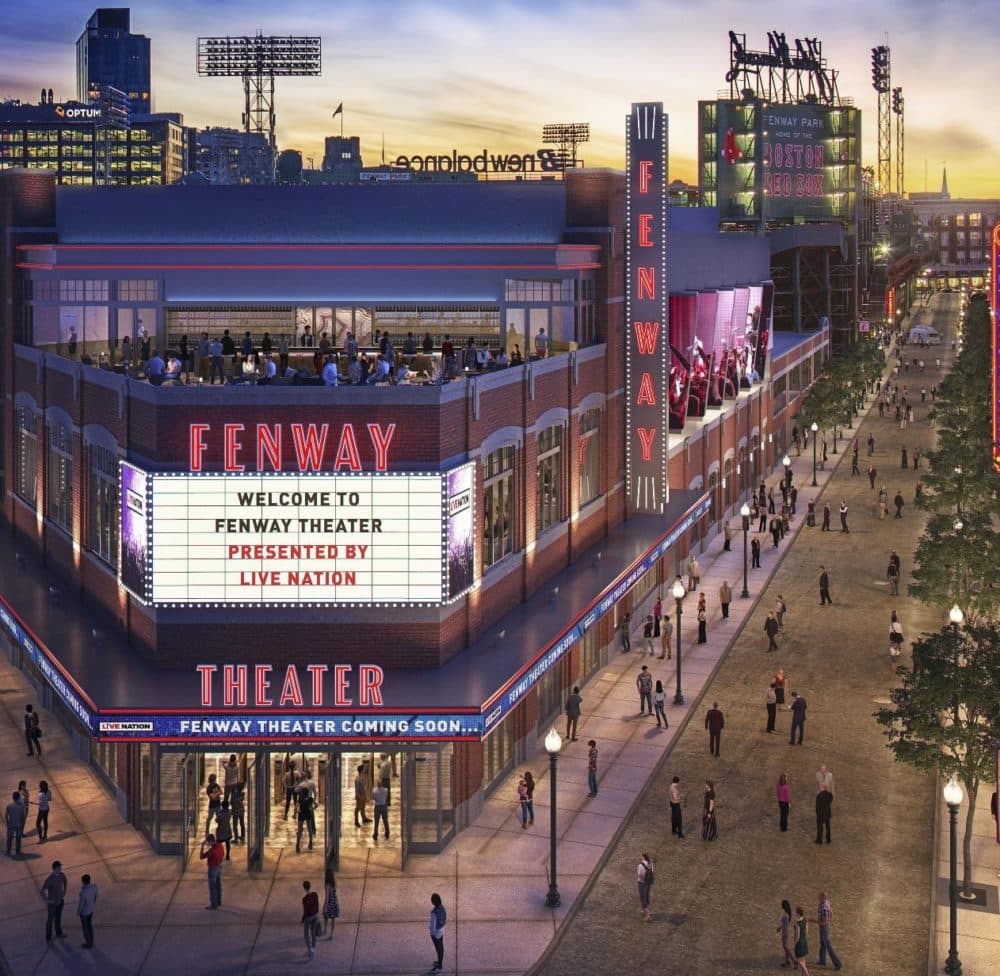Advertisement
6 Takeaways From The Proposal For A Fenway Park Theater

The parent company of the Boston Red Sox is looking to make the Fenway neighborhood a hub for the arts as well as sports.
The Fenway Sports Group submitted a 333-page proposal to the Boston Planning & Development Agency last month detailing its plans for a performing arts center next to Fenway Park, the home of the Boston Red Sox. The company began its application to the city last December.
The proposed site is a triangular piece of land on the intersection of Lansdowne and Ipswich streets, currently occupied by a parking lot and a parking garage connected to the ballpark.
The proposal envisions tearing down part of the parking garage and demolishing the parking lot to make room for the theater, which renderings depict as a blunt-faced triangular building with a rooftop bar and a red brick facade, designed to match Fenway Park. The theater will have a capacity of 5,400 and hold an estimated 110 to 150 events per year, according to the plans.
Here are a few key things to know about the Fenway Theater proposal:
1. The Fenway Sports Group isn’t neglecting sports.
The Fenway Theater plan also includes changes to Fenway Park. The company is proposing a two-story addition above the parking garage, which will include game-day amenities like new seating overlooking the ballpark, concessions and a bar. The upper level will be an event space.
2. The proposal is aimed at bringing more business to the Fenway outside of baseball season.
The Red Sox brought an average of 35,747 people per game to Fenway Park in 2018, but that's only from spring to fall. One goal of the Fenway Theater plan is to make the neighborhood a year-round destination. The Fenway Sports Group estimates that the theater will generate tens of millions of dollars in added revenue for local restaurants and shops, especially in the Fenway and Kenmore Square. The plan also projects that the theater will employ approximately 80 full-time and 450 part-time workers.
3. There will (hopefully) not be a concert venue war on Lansdowne Street.
If approved, the Fenway Theater will be right down the street from the House of Blues, but they won’t be competitors. The venues will both be managed under a new partnership between Fenway Sports Group’s marketing arm and venue operator Crossroads Events.
“This relationship will ensure that scheduling of events planned for the two venues will be closely coordinated,” the plan states.
4. The developers see a gap in Greater Boston’s performing arts scene — and they think they can can fill it.
“The Fenway Theater is intended to fill a void in the landscape of performing arts venues in the greater Boston area,” the plan says. That void, according to the plan, exists between venues with fewer than 2,500 seats and large stadiums.
The performing arts scene in Greater Boston also suffers from another imbalance, with dozens of venues for audiences of fewer than 400 people, but only nine that can accommodate between 400 and 999 people, a city-commissioned study showed last year.
5. The Fenway Sports Group is looking to collaborate with local schools.
The Fenway Theater’s proposed location is minutes away from Berklee College of Music and the New England Conservatory. Plus, the new Boston Arts Academy building will be right down the street.
“Through collaboration and partnerships with these institutions, it is expected that thousands of local students and performers will have the opportunity to perform in this new venue, pursue employment and internships, engage in professional development and educational programs, and enjoy live performances as both performers and audience members,” the plan says.
Kelly Brilliant of the Fenway Alliance, a neighborhood arts advocacy group, says the theater needs to make those collaborations happen for the project to be a success.
“We have so much local artistic and performing talent here in Boston, so it would be nice if they could showcase that talent,” Brilliant says.
She hopes that students at nearby music schools will not only get to perform at the Fenway Theater, but meet the professional musicians that come through on tour.
6. If the city approves the project, the plan says construction will start this fall.
After baseball season ends, of course. First priority will be the construction that affects Fenway Park, like the partial demolition of the parking garage. The goal is to complete all construction, including the Fenway Theater, by 2021.